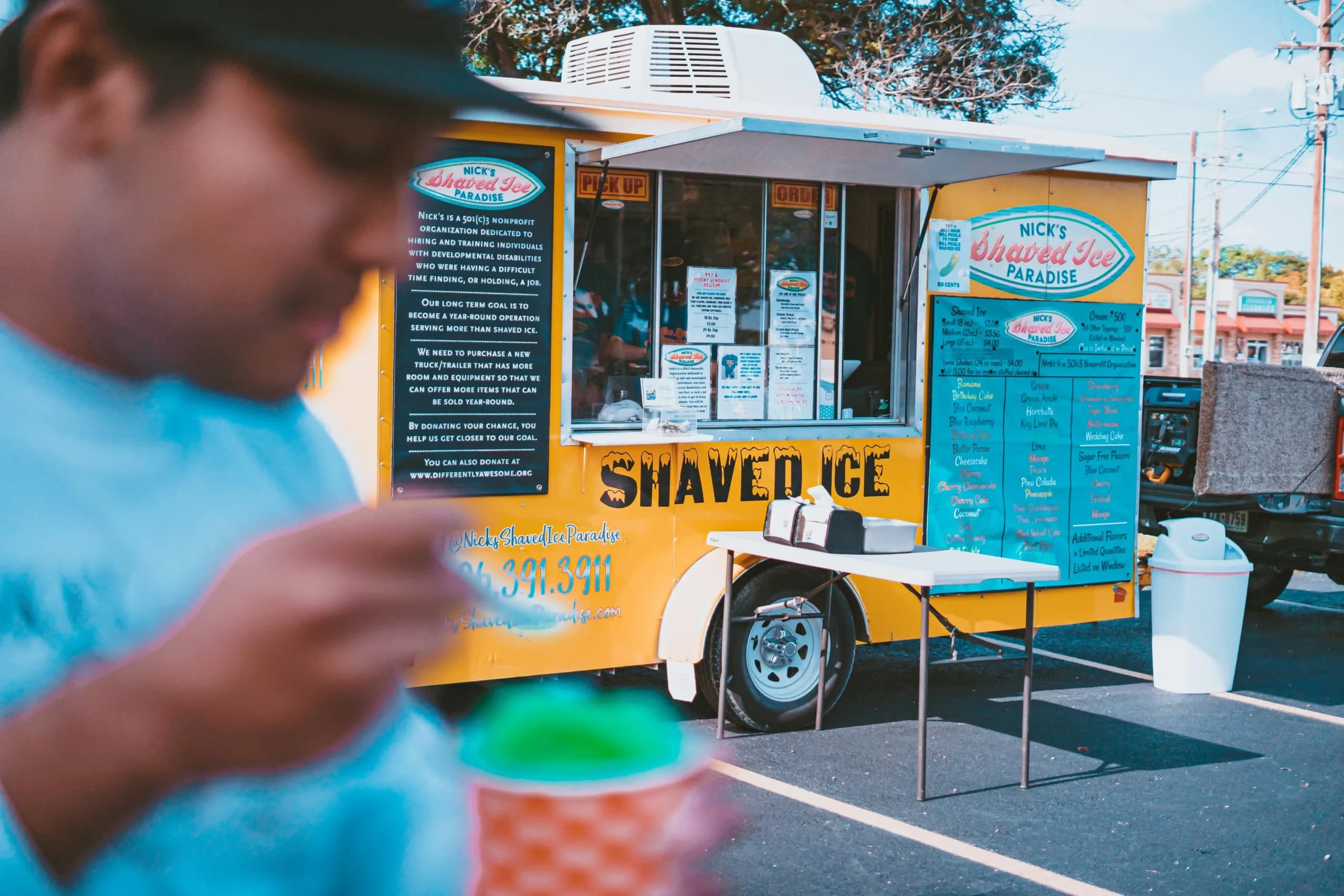Food truck owners have strong potential to thrive in Idaho. The Gem State’s diverse agricultural landscape lends itself to a rich and unique culinary culture, while its booming outdoor recreation scene creates a steady demand for on-the-go dining experiences. There are many potential markets to tap into, from small urban hubs like Boise and Meridian, to tourist hotspots like Coeur d’Alene, to the many farmers’ markets across the state’s rural towns.
However, before you can legally open a food truck in Idaho, you need to obtain relevant business permits and licenses. Satisfying these requirements proves that you can meet the state’s standards of financial fairness, health, and food safety. We’ve listed them below to help you get started.
Idaho food truck requirements checklist
Obtaining all the required licenses for operating a food truck in Idaho involves several important steps. Fortunately, the official Idaho government website offers many helpful resources to assist you throughout the process.
To make things easier, we’ve summarized the key steps below:
- Register your business
- Acquire a business license from your city clerk’s office, county clerk’s office, or recorder office.
- Obtain a sales and use tax permit from the Idaho State Tax Commission.
- Submit a mobile food establishment license application packet to the CDH. Your packet should include the following documents:
- Completed application
- Drawing of food truck floor plan or layout
- Copy of menu
- List of food truck equipment
- Mobile food unit operational plan
- Facility plan review
- Commissary agreement (if applicable)
- Have your local health district review your mobile health unit operational plan
- Schedule a preoperational review with the CDH
Our article discusses each requirement in greater detail, breaking down what they are, how to get them, and why they matter.
1. Business registration
Unless you are a sole proprietor who plans to operate using your full legal name, you need to register your business with the Idaho Secretary of State. Registration creates a separate legal entity for your business, subjects it to Idaho business laws, and grants it legal business protections.
The first step in registering your business is determining your business entity type, which dictates what taxation laws your business will follow. Most food trucks operate as sole proprietors, corporations, LLCs, and partnerships.
During the registration process, you will also need to register your business name. Sole proprietors and partnerships must file an assumed business name or a Doing Business As (DBA) for a fee of $25 to distinguish the name under which they operate as.
You will also need to appoint a registered agent. The government will recognize this individual as the designated recipient of legal documents and official government correspondence. All registered agents need to have a physical address in Idaho.
You can register online through the official Idaho government website or submit a form via mail. The form will ask you to provide the following information:
- Entity name
- Date when business shall be effective
- Principal and mailing address
- Name of registered agent
- Names of incorporators and directors
Only after you complete your business registration can you begin acquiring other licenses.
2. City or county business licenses
While Idaho does not issue a statewide business license, counties and cities may have their own unique business regulations. Check with the clerk’s office or recorder office in the city or county you plan to operate in to see if you are required to apply for a business license.
3. Sales and use tax permit
Any business that sells taxable goods and services in Idaho must acquire a sales and use tax permit to operate legally within the state. This permit proves to the state that your business collects and remits the appropriate amount of state sales tax. You can obtain a sales and use tax permit from the Idaho State Tax Commission via mail or the official website.
4. Mobile food establishment license
All food truck owners must acquire a mobile food establishment license from the Idaho Central Health District (CDH). The application process for a mobile food establishment license evaluates your layout, menu, equipment, and processes are conducive to food safety.
The CDH accepts mobile food establishment licence applications via email. It requires businesses to complete applications at least 30 days before opening or a change of ownership.
The application fee for a full-service food truck is $80 if operating without a commissary and $100 if operating with a commissary. You will also need to pay a plan review fee of $100 for your local health district to review your mobile food unit operational plan.
The mobile food establishment license application packet consists of multiple requirements. These are:
- Completed application
- Drawing of food truck floor plan or layout
- Copy of menu
- List of food truck equipment
- Mobile food unit operational plan
- Facility plan review
- Commissary agreement (if applicable)
Mobile food unit operational plan
One of the most important documents is the mobile food unit operational plan. This plan explains how your food truck will comply with local food safety standards. It should include information about the following:
- Food preparation processes
- Food storage and handling procedures
- Descriptions of food truck equipment and layout
- Water supply and waste disposal
- Staff protocols
- Cleaning and sanitization procedures
- Operational schedule
- Commissary use (if applicable)
You need to secure approval for your mobile food unit operational plan before proceeding with any construction or remodeling initiatives. Once approved by your local health district, you are required to notify the Central Health District and schedule a preoperational review at least 15 days before opening.
Commissary agreement
Should you choose to operate with a commissary, you need to include a commissary agreement in your mobile food unit application. This document specifies which food truck operational activities you will use your commissary for and on what schedule (daily, weekly, or other).
Possible commissary activities include:
- Chemical storage
- Food preparation
- Food storage
- Fresh water supply
- Garbage disposal
- Grey water disposal
- Vending unit cleaning facilities
- Warehouse facilities
Renewal schedules to remember for Idaho food trucks
Keep in mind that obtaining licenses is rarely a one-and-done task. The state sets expiration dates for many licenses to account for inevitable changes in both your business and state regulations.
To keep your operations running smoothly, it’s important to stay on top of renewal timelines. Being proactive about renewals helps you avoid potential issues like fines, temporary closures, or other legal complications.
| Requirement | Issuer | Renewal schedule | Notes |
| Business registration | Idaho Secretary of State | Annually | Requires annual report |
| Business license | City clerk’s office, county clerk’s office, or recorder office | Annually | N/A |
| Sales and use tax permit | Idaho State Tax Commission | N/A | Not required |
| Mobile food establishment license | Idaho Central Health District | Annually | Costs $80 for food trucks with no commissary, $100 with commissary |
| Mobile food unit operational plan | Idaho Central Health District | Per remodel | Costs $100 |
On the go in Idaho
Don’t be intimidated by Idaho’s extensive food truck licensing process. With solid preparation, you can easily stay ahead of all legal requirements and essential tasks, ensuring smooth and successful food truck operations.
Once you’re on the move, the right tools can make a big impact. 7shifts, a leading workforce management platform, helps streamline food truck operations through features like automated scheduling, team communication, and employee engagement tools. By reducing manual work, you have more time to focus on what matters most: growing your business.

Rebecca Hebert, Sales Development Representative
Rebecca Hebert
Sales Development Representative
Rebecca Hebert is a former restaurant industry professional with nearly 20 years of hands-on experience leading teams in fast-paced hospitality environments. Rebecca brings that firsthand knowledge to the tech side of the industry, helping restaurants streamline their operations with purpose-built workforce management solutions. As an active contributor to expansion efforts, she’s passionate about empowering restaurateurs with tools that genuinely support their day-to-day operations.
